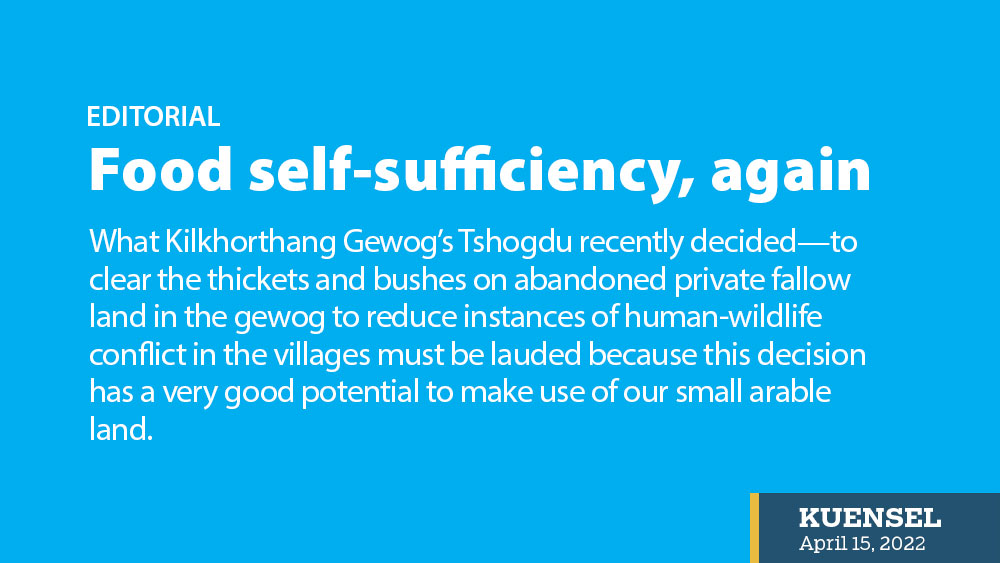What Kilkhorthang Gewog’s Tshogdu recently decided—to clear the thickets and bushes on abandoned private fallow land in the gewog to reduce instances of human-wildlife conflict in the villages must be lauded because this decision has a very good potential to make use of our small arable land.
Goongtong is an issue that we are grappling with today, which will only grow in the future. But in a country that has set its eyes on food self-sufficiency since the first day of the first five-year plan, leaving somewhere around 66,120.34 acres fallow shows where things have gone wrong in planning.
That’s why Kilkhorthang Gewog’s is exemplary, which should be followed by all the gewogs in the country that are seeing increasing goongtong issue.
Sections 130 and 131 of the Land Act give the local authority the responsibility to monitor and enforce the provision on underutilisation and underdevelopment of registered land. Invoke these sections. Sections 215, 216, 217, 218 of the Act also give the local authority to issue a written notice to occupy the unused land.
Why is this not happening?
Agricultural practices have undergone a huge change over the years. Until a decade ago, for example, agriculture was practiced on a subsistence basis. With improved network of road accessibility and transportation in the country, an increasing number of farms are shifting from subsistence-based farming to commercial agriculture.
Yet the shortage of farmland is an issue. The government of the day has the responsibility to make use of fallow land in the country by attracting commercial farming with subsidies.
For example, a growing number of urban residents seem to be embracing agriculture initiatives in dzongkhags such as Thimphu, Punakha, Bumthang, and Sarpang.
According to the Department of Agriculture’s Urban Agriculture Initiative, more than 351 beneficiaries are working on a total of 97 acres of land this year, up from 277 in 2021. In Thimphu alone, there are 241 beneficiaries.
Given the right conditions, agriculture development can be easy. We no longer have to worry about the shortage of water. More investments must come to attract young people to take up agriculture.
Agriculture must be seen as a huge business opportunity because the demand for organic and high-end produce will only increase.
There are a couple of things that we need to first understand to bring significant development in the sector. The land is an issue. Our farmers do not have enough land for large-scale production. The bigger problem is that their landholding is decreasing by the year. The government can come in to solve this issue by leasing the unused farmlands in the country.
The issue of goongtong can be solved by asking the landowners to make use of land or surrender to the State so that we can make good use of the already small arable land to feed ourselves.
It would be unfortunate for the country to let such opportunities go to waste. We may do well to remind ourselves that food self-sufficiency has been Bhutan’s dream since the first plan period in 1961. But how far have we come today?


